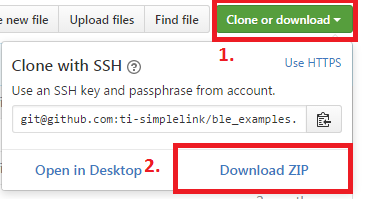This repository contains additional sample applications and components for the Texas Instruments Bluetooth® Low Energy software development kit. All Github sample apps are compatible with the latest BLE-Stack SDK.
To use the examples and tools in this repository, please download and install the SDK first, and if necessary buy an evaluation kit.
For other hardware and software resources, please visit our wiki. If you have any questions please refer to the FAQ page.
Note: Not all additional sample projects are migrated to GitHub - please refer to the Examples List below.
This repository can be cloned and tracked using Git. For instructions on how to clone a repository from Github please refer to this guide: Clone from Github
For users who are unfamiliar with Git, there is the option of downloading the contents of the repository as a zip file. See instructions below.
- Click the green "Clone or download" button
- Select "Download ZIP" option
- Zip folder will appear in your Downloads folder
This repository can be cloned/download anywhere on your computer. There is a dependency between this repository and the BLE SDK install location.
By default the BLE SDK will install to:
C:\ti\simplelink\ble_sdk_2_02_01_18
If the BLE SDK must be installed to a different location, then the examples in this repo will need to have the following environment variable updated
TI_BLE_SDK_BASE
Follow your IDE specific instructions for changing environment variables or simply do a global search and replace within the ble_examples folder. See the FAQ page for more details.
By default, TI_BLE_SDK_BASE points to C:\ti\simplelink\ble_sdk_2_02_01_18\. If you installed the SDK there, no change is required.
Similar to the BLE-Stack SDK, the examples in this repository support the IAR and CCS toolchains. Please pay careful attention to versions of these tools, the supported version are listed below. Using a non supported version is untested and may result in unexpected behavior.
- IAR for ARM v7.70.2
- CCS v6.2.0 with TI ARM Compiler v5.2.6
For more information on toolchain setup, please refer to our FAQ page.
The FAQ page will try to address some of the common questions related to the ble_examples repo.
The following examples are currently supported:
Send BLE advertisements directly using the RF driver
docs | project files | src
Taking the BLE SDK HID advanced remote example and enableing Privacy 1.2
docs | project files | src
Emulate emulate a HID keyboard using the LaunchPad
docs | project files | src
Implement multiple GAP roles on a single device.
docs | project files | src
Demonstrate BLE 4.2 Security Features on CC2650
docs | central project files | peripheral project files | central src | peripheral src
Demonstrate an implementation of a beacon that uses iBeacon technology
docs | project files | src
Receive and decode a voice stream over BLE using CC2650 central device and SensorTag or
HID Advanced Remote peripheral device
docs | project files | src
Demonstrate an implementation of a beacon that uses the Eddystone beacon format
docs | project files | src
Demo Peripheral and observer roles on CC2650
docs | project files | src
Demonstrate an implementation of a beacon that uses a potential proprietary beacon format
docs | project files | src
Send bidirectional UART data over BLE, similar to Serial Port Profile (SPP) in Bluetooth Classic
docs | client project files | server project files | client src | server src
Demonstrate the maximum theoretical throughput of a BLE link using the 2x CC2650 devices.
These projects include a demo of 4.2 Data Length Extension, which improves throughput.
docs | central project files
peripheral project files | central src | peripheral src
Show implementation of the ROM Bootloader running from Flash memory.
docs | project files | src
Demonstrate a central device disovering and connecting to multiple peripherals.
docs | project files | src
The following reference pages may be helpful during general BLE development. New users of the CC26xx platform and BLE are encouraged to read the Software Developer's Guide and complete the SimpleLink Academy training.
Other resources can be found below:
